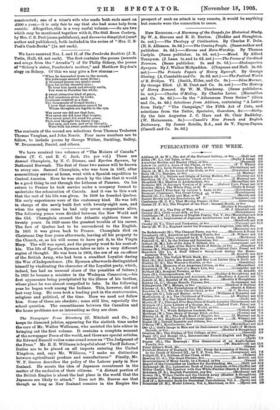We have received two volumes of "The Makers of Canada"
Series (T. C. and E. C. Jack, 21s. per vol.) These are Samuel Champlain, by N. C. Dionne, and Egerton Ryerson., by Nathaniel Burwash. The first of these two names will be known to every one. Samuel Champlain, who was born in 1567, after somemilitary service at home, went with a Spanish expedition to Central America. Here he was struck by the idea that it would be a good thing to cut through the Isthmus of Panama. On his return to France he took service under a company formed to undertake the colonisation of Canada. And it was to this work that the rest of his life was given. In 1608 he founded Quebec. His early experiences were of the customary kind. He was left in charge of the newly built fort with twenty-eight men, and when the spring came he had only seven companions alive. The following years were divided between the New World and the Old. Champlain crossed the Atlantic eighteen times in twenty years. In 1629 came the greatest trouble of his career. The fort of Quebec had to be surrendered to the English. In 1631 it was given back to France. Champlain died on Christmas Day four years afterwards, leaving all his property to the Church, or, as his will seems to have put it, to the Virgin Mary. The will was upset, and the property wont to his next-of- kin. The life of Egerton Ryerson takes us into a very different region of thought. He was born in 1803, the son of an ex-officer of the British Army, who had been a steadfast Loyalist during the War of Independence. (Dr. Ryerson afterwards distinguished himself by vindicating the character of the Loyalist party, which, indeed, has had an unusual share of the penalties of failure.) In 1825 he became a minister in the Wesleyan Connexion,-his first appearance being precipitated by the illness of his brother, whose place he was almost compelled to take. In the following year he began work among the Indians. This, however, did not last very long. He soon took a leading part in the controversies, religious and political, of the time. Here we need not follow him. Some of these are obsolete ; some still live, especially the school question. The resemblances between the Canadian and the home problems are as interesting as they are close.


































































 Previous page
Previous page